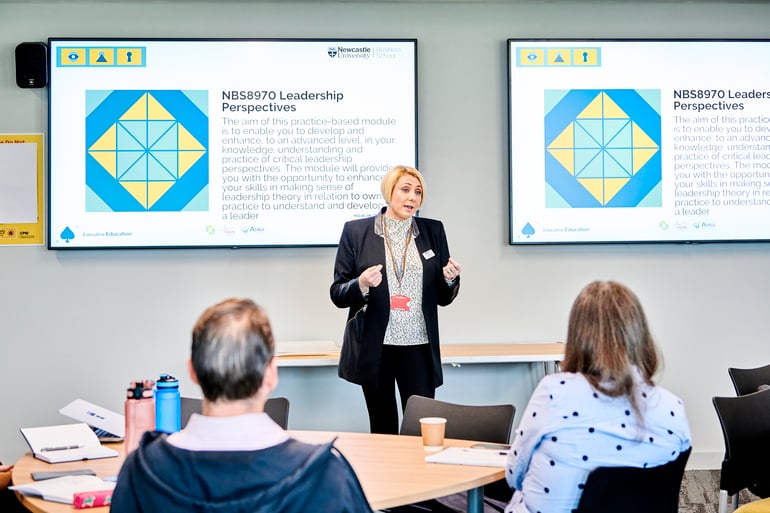The ‘invisible discourses’ shaping your leadership practice
12 July 2023 | By: Newcastle University | 3 min read
Are invisible discourses sabotaging your business without you even knowing it? Leadership experts Dr Nicola Patterson and Professor Sharon Mavin shine a spotlight on the causes and consequences of invisible discourses before they can affect your leadership practice.
Contents:
-
Invisible discourses – a hidden threat
-
Visible consequences – why you should care
-
A discourse of merit
-
Learning about invisible discourses
-
Recommended leadership programmes
Invisible discourses – a hidden threat
Discourses are literally all around us – influencing our thinking and decisions, and shaping leaders. We think we are acting as independent individuals, but we are actively influenced by invisible problems and discourses all the time.
We can’t physically see them, yet discourses are incredibly powerful. They act to manipulate the judgements we make and the actions we take. We can find discourses in our own language and the words of others, in our actions, in the words and phrases we use, in our dialogue (both internal and spoken), and in how discourses provoke our practices.
Visible consequences – why you should care
A discourse communicates the taken-for-granted assumptions, expectations and rules which are common in our worlds, our personal life, at work and in society.
Discourses are highly active in organisational cultures, conveying ‘how things are supposed to be done around here’. They are a significant factor in stalling organisational change. Discourses become embedded in cultures and in people’s thought processes. They both subtly and explicitly let us know how we are to behave and respond to certain things in organisations.
If we act in ways opposite to invisible discourses, then we can be socially punished by being excluded, made to feel ‘unaccepted’ and ‘unacceptable’, that we don’t ‘fit’ and we become increasingly uncomfortable at work. Discourses communicate social norms.

A discourse of merit
In the UK, we are surrounded by a discourse of merit. Britain is said to be a meritocracy where everyone with skill and imagination can reach the highest level. We know this just doesn’t happen – it isn’t the case. Yet as leaders, we use the language of merit all the time.
How many times do you hear the term ‘merit’ when talking about appointments, promotions, or secondments? Any time people are selected to do certain roles – and frequently when we talk about equality, equity, and diversity in organisations – the term ‘merit’ appears, often as a defence to why we can’t do certain things. For example, ‘we appoint on merit’ or ‘we should only look at merit’.
But what does merit look like in your organisation? Can you show it to people? Can you describe what merit is in your organisation? Beyond a list of essential and desirable skills, knowledge, and abilities, how do you show merit? How do you know merit when you have it?
We talk of merit as if it is objective. We defend organisational meritocracy on the basis that it is about ability, not personal characteristics or social context. A discourse of merit creates a pretend ‘level playing field’ of fair chances for all in open competition, dependent on individual effort. Those with merit are rewarded for talent; those who don’t succeed have a lack of merit.
Meritocracy is like ‘Teflon’ – it sticks to some and slides off others [1].
Meritocracy in organisations is subjective, not an objective and rational concept, process, or culture. The level playing field doesn’t exist; some face undeniable obstacles along the way that others don’t.
A discourse of merit influences you and acts to maintain the status quo, covering up social processes of opportunism, social capital, and nepotism, combined with discrimination.
Merit is paradoxical. When an organisation claims it operates based on merit, this strengthens biases in favour of men over equally performing women[2]. People can show greater levels of discriminatory bias when a strong discourse of merit operates. You can easily interrogate this by examining how diverse each level of hierarchy is in your organisation.

Learning about invisible discourses
In our leadership programmes, we introduce you to a range of discourses that are actively shaping leaders, such as merit, competition, and neoliberalism.
-
We begin with you and develop your self-awareness of the various discourses at societal and organisational levels.
-
We support you to become aware of how these have impacted your life story to date and are now impacting your leadership practice.
-
We introduce you to new ways of thinking about discourses and ways you can safely challenge your assumptions through self-reflexivity, and facilitate learning to help you make sense of leadership in relation to the discourse from a range of perspectives, allowing you to do a deep dive into your own experiences. This supports you to recognise the power of discourses influencing how you relate to others in your organisation.
-
We also focus on the significant changes in work and society which are disrupting embedded discourses. This safely takes you out of your comfort zone to consider leadership in new innovative ways.
Throughout the leadership programmes, we consider aspects of invisible problems and discourses, and how they operate through research, policy and lived experiences. We encourage you to experiment with new leadership approaches in your organisation, within a safe context.
Recommended leadership programmes:
-
The Level 7 Senior Leader Apprenticeship is a qualification aimed at individuals who are in - or moving into - strategic roles. It will support organisations that want to build leadership capacity within their team. We work closely with the Chartered Management Institute (CMI). The apprenticeship is a vocational part-time programme, which allows learners to study alongside work. It combines personal and professional development with a focus on workplace performance allowing employees to utilise learning in the workplace throughout the programme.
-
The Strategic Leadership MSc is a part-time, flexible, work-based programme. It's delivered using a blended learning model. You'll have monthly one-day study blocks on campus during teaching time. This will still allow you to study flexibly around your commitments. The MSc is designed for established organisational leaders and for those aspiring to become one.
.jpg?width=770&height=536&name=exec_ed_109%20(1).jpg)
Find out more:
-
Dr Nicola Patterson is a Senior Lecturer in Leadership Development at Newcastle University, Co-founder and Co-Chair for Gender and Entrepreneurship North East (GENE), and Degree Programme Director for the MSc Strategic Leadership & Strategic Leadership Level 7 Senior Leader Apprenticeship.
-
Professor Sharon Mavin is the Professor of Leadership and Organisation Studies at Newcastle University. Her research focuses on leadership, women leaders’ experiences, gender, and identity.
-
Discover more about the Strategic Leadership MSc and the Level 7 Senior Leadership Apprenticeship programmes at Newcastle University by reading their course overviews.
References:
[1] Simpson, R. and Kumra, S., 2016. The Teflon effect: when the glass slipper meets merit. Gender in Management: An International Journal, 31(8), pp.562-576.
[2] Castilla, E.J. and Benard, S., 2010. The paradox of meritocracy in organizations. Administrative science quarterly, 55(4), pp.543-676.
